Xi Jinping’s refusal to call Donald Trump despite the White House’s begging was not the only thing that shocked the U.S. president. Other world leaders, like Malaysia Prime Minister Anwar Ibrahim, who is still lobbying for his first phone call after the POTUS had calls with almost all leaders in the Southeast Asia except him, would do anything just to have a short chat with the world’s most powerful man.
According to the White House officials, there was another thing that they did not expect – Beijing’s tariff retaliation. The Trump administration was expecting China to protest and complain at most, but certainly not to the extent of matching the U.S. tariffs all the way from 34% to 125%. Beijing deliberately turns a deaf ear over the White House’s warning – “DO NOT RETALIATE AND YOU WILL BE REWARDED.”
China’s defiance has forced Trump’s half-baked advisers like Treasury Secretary Scott Bessent, Commerce Secretary Howard Lutnick and Trade Advisor Peter Navarro to go back to the drawing board. The wishful thinking of celebrating Trump’s first 100 days with victories has turned into a disaster – neither a Ukraine-Russia peace deal nor a U.S.-China trade deal is working according to the plan.
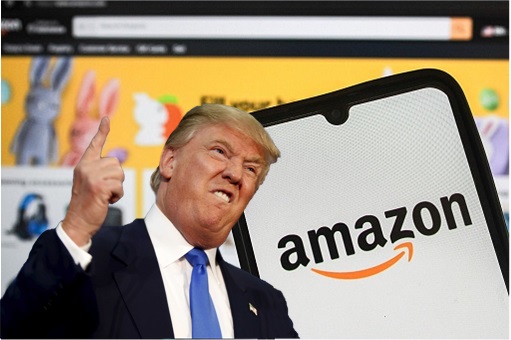
Rather than dancing to Trump’s tune, Beijing has not only slapped a 125% tariff, but also unleashed non-tariff attacks on the U.S. – cutting off rare earth supply, warning 270,000 students and millions of tourists to avoid America, and suspending purchases and deliveries of Boeing – forcing brand-new 737 MAX 8 aircrafts originally destined for a Chinese airline to fly back to the U.S.
Dozens of U.S. businesses have also been blacklisted in the “unreliable entity” list while at the same time, Beijing has opened antitrust probes into American companies, such as pharmaceutical giant DuPont. China is also ready to escalate the trade war to include service trade – which covers travel, legal, consulting and financial services – where the U.S. has been running a huge surplus with China for years.
It works like a charm. Trump immediately went ballistic and increased tariffs to 245%, before admitting going higher will be meaningless. He then made a spectacular U-turn, announcing that the freshly imposed tariffs on China would be slashed to reportedly between 50% and 65%, before Bessent contradicted his boss’ after the U.S. President was mocked for chickening out.
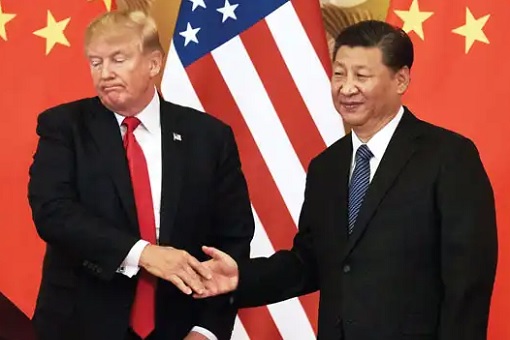
Obviously, Mr Trump’s playbook cannot be used after Mr Xi’s unexpected retaliation. That explains why, like a comedy show, Trump, Bessent and Press Secretary Karoline Leavitt keep contradicting each other. Trump claimed Xi had called him, only to be denied by Leavitt whilst Bessent said he was not sure if both leaders were talking. Trump announced a slash on tariff, only to be rubbished by Bessent. But there’s one thing they all have in common – trying to hide tariff price hikes.
Apparently, President Donald Trump was extremely angry about a news report that Amazon plans to display the costs of new tariffs next to the total price of products to American consumers. So, he called Amazon founder Jeff Bezos on Tuesday morning (April 29) to complain for fear of public backlash if Americans are shown the “before tariffs” and “after tariffs” prices.
Under pressure, Amazon decided to scrap the plan. But that didn’t stop the world, especially China, from watching how the panicked White House attacked the U.S. online retail giant. Press secretary Karoline went bonkers – “This is a hostile and political act by Amazon. Why didn’t Amazon do this when the Biden administration hiked inflation to the highest level in 40 years?”
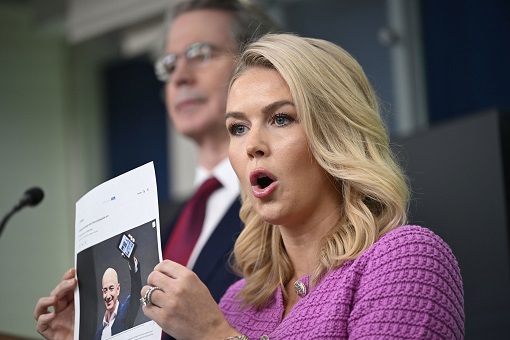
Perhaps Amazon was just testing the water to see the reaction from the clueless White House. Perhaps Bezos was merely trying to provoke Trump – a tactic to earn a favour by offering to abandon a plan which was never intended to be implemented in the first place. But the reactions from Trump and Leavitt were a “crystal-clear proof that it’s the American consumer, and not China, who is going to have to pay for tariffs.”
Karoline Leavitt has even accused Amazon of “partnering with a Chinese propaganda arm.” However, the e-commerce giant is not the first retailer to highlight how Trump tariffs are changing its prices. China-based fashion giants Shein and Temu have both added massive surcharges in recent days. Temu now includes a line on its checkout tally showing an “import charge” that adds around 145% for each item.
Here’s the burning question – if a trade war is easy to win and tariff is the most beautiful word to Trump, should not the president proudly show the after-tariff-price to all and sundry. More importantly, if indeed tariffs are paid by China, as most Trump’s gullible supporters foolishly swallowed the hook, line and sinker, why was Leavitt so mad and furious and desperately wanted to hide it?

After billionaire Bezos agreed to help desperado Trump hides the tariffs from American consumer, the president praised the Amazon founder as a “very nice guy” who had done the “right thing”. But that won’t change the fact that Americans have to pay higher prices thanks to 145% duty on China, where up to 70% of Amazon goods are sourced.
Despite Trump administration best effort to prevent Americans from finding out how much more they are paying due to tariffs, prices have started rising such as the 42.9% price increase for Barbie doll. A summer dress sold on Temu for US$18.47 will now cost US$44.68 after US$26.21 on import charges are added to the bill, a 142% surcharge.
But even before empty shelves hit American stores in the next 2 weeks as shipping volume begins to drop at least 35% next week at the Port of Los Angeles, the U.S. economy had already shrunk 0.3% in the first 3 months of 2025 – the first GDP plunge in 3 years. It grew at a solid pace of 2.4% in the final 3 months of 2024, meaning the economy had actually dropped by 2.7% due to Trump’s tariffs.

Yet, as expected, Trump blamed his predecessor Joe Biden for the bad economic news. Exactly how could it be Sleepy Joe’s problem when Trump has already returned to the Oval Office since January 20, and celebrated his 100-day as the U.S. president? Even though it was largely due to businesses rushing to stock up on imports ahead of tariffs, it’s still Trump’s fault.
Another episode of comedy and contradiction started when Trump’s top trade adviser, Peter Navarro, called the GDP report “the best negative print I have ever seen in my life.” The clueless spin doctor has shamelessly twisted the increase of inventories ahead of tariffs as a great “22% increase in domestic investment”. In truth, the economic slowdown was largely due to Americans cutting their spending on goods.
Consumer spending, which powers about 70% of the U.S. economy, slowed sharply in the first quarter to 1.8% – down significantly from 4% in the prior three-month period. Heck, even government spending dropped to -5.1% from 4% during the same period. Even the consumer spending in the first quarter could be due to a rush to buy before the tariffs kick in.

Sure, technically, we still can’t call it a recession yet. But a recession – defined as two consecutive quarters of negative GDP – could quickly explode. Not only economy output is shrinking, but the stock market has dropped sharply and consumer confidence has tumbled to its lowest level since the Covid-19 pandemic, not to mention the plunging value of U.S. dollar and the lost of investor confidence in the U.S. bond market.
On the other hand, while the U.S. economy contracted by 0.3%, the reverse happened in China where its economy expanded by 5.4% in the same quarter- faster than expected. Of course, President Donald Trump, Treasury Secretary Scott Bessent, Commerce Secretary Howard Lutnick, Trade Advisor Peter Navarro and Press Secretary Karoline Leavitt will avoid any mention of the Chinese economic growth for obvious reasons.
Trump’s supposedly brilliant tariffs – designed to squeeze and cripple China and stimulate domestic manufacturing – have so far produced the opposite effect, weakening the U.S. growth while accelerating the Chinese’s economy. The White House brags that China will be forced to negotiate, only for Trump to blink and shows signs of desperation and frustration as Beijing remains defiant and refused to be bullied.

Amusingly, the tariff war opens a window for China to do exactly what Trump hoped to prevent – build new trade relationships, reduce reliance on the U.S., grow domestic consumption, export to U.S. allies and reposition China as a reliable and strong trading partner. Instead of isolating China, it’s the U.S. who got trapped and isolated itself.
The U.S. retailers pre-emptive stockpiling of inventory during the January-March period has caused China’s manufacturing factory in April to drop to 49.0 from 50.0 in March – a 2-year low. While pro-Trump may argue that this is a sign of the Chinese economic damage as a result of U.S. tariffs, one can also argue that April-June could be another quarter of economic contraction in the U.S. – pushing it into recession.
Bessent was bluffing – and Beijing could smell his panic some 7,000 miles away – when he said it’s up to China to de-escalate the trade war. Like a broken record, he keeps arguing that Beijing must kowtow because “they sell five times more to us than we sell to them, and so these 120%, 145% tariffs are unsustainable”. Exactly why should Beijing de-escalate a tariff war started by President Donald Trump?
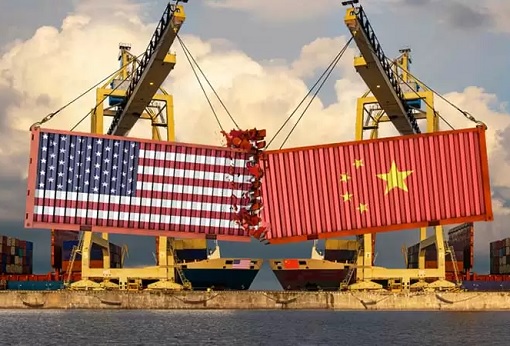
It was like Mr Bessent complained that he bought 5 times more from a nearby bakery but they bought nothing from him. To punish the bakery for ripping him off, he imposed a 145% tariff on the shop. When the bakery owner retaliated with 125% tariff on Bully Bessent, effectively refused to sell any bread to him, Bessent got upset and now says it’s up to the bread shop “de-escalate”. How stupid can he be?
Crucially, why should Xi Jinping de-escalate when it was the U.S. economy that shrank 0.3% whilst China’s economy grew by 5.4%? And if it’s true that China has more to lose, why on earth did Trump express his desire to slash 145% tariffs even before any negotiation could take place with Beijing? Heck, why must Donald Trump even lie about talking to Xi Jinping if China needs the U.S. more than the U.S. needs China?
If it’s true that the tariffs would hurt China more than it would damage the U.S. economy, why Trump had to call Jeff Bezos to hide the costs of new tariffs next to the total price of products on Amazon? In truth, exports to the U.S. accounted for 3.5% of China’s GDP in 2018, and dropped to only 2.9% in 2023. Therefore, in an event of a complete decoupling between China and the U.S., the Chinese economy will still grow.

Other Articles That May Interest You …
- Empty Store Shelves In 2 Weeks – Here’s Why Trump’s Damage Control Is Too Little Too Late, And It Will Be Ugly
- Trump Chickening Out – To Slash Tariffs On China To 50%-65%, Won’t Fire Fed Chair Powell
- Trump Has Already Lost His Trade War Against China – But He Can’t Find Ways To Climb Down And Save Face
- White House Privately Begging Xi To Call Trump First – But China Slapped 125% Tariff Instead
- Beijing Raises Tariffs To 125% – American Goods No Longer Marketable In China
- Forget Stock Markets, U.S. Bonds Crashes – US Panic As China Punched Back With 84% Tariffs And Devaluing Of Yuan
- Trump Crashes Stock Markets, Dollar & Oil – Here’s Why China Retaliates With 34% Tariff, And Wiped Off $6.6 Trillion
- Recession 2025 – Why You Should Prepare For A Historic Crash As Massive Correction Builds
- $6.4 Trillion Wipeout – Financial Meltdown Has Begun As The U.S. Heading Toward A Recession
- De-Dollarization Kicks Into High Gear – Chinese Yuan Hit Record High, Overtook Japanese Yen As 4th Most Used Currency
- From Terminating Trade Deal To Cancelling $1.1 Trillion Debt Owed To China – Here’re Some Of Trump’s Crazy & Dirty Ideas
- Watch Out Trump!! – China May Weaponize “Rare Earth” To Retaliate Against U.S.’ Ban On Huawei

|
|
May 1st, 2025 by financetwitter
|


|

|

|

|

|

|






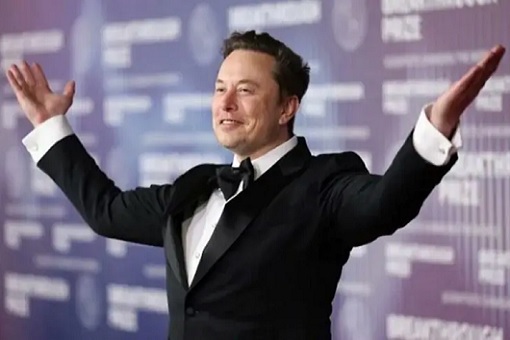





















Comments
Add your comment now.
Leave a Reply